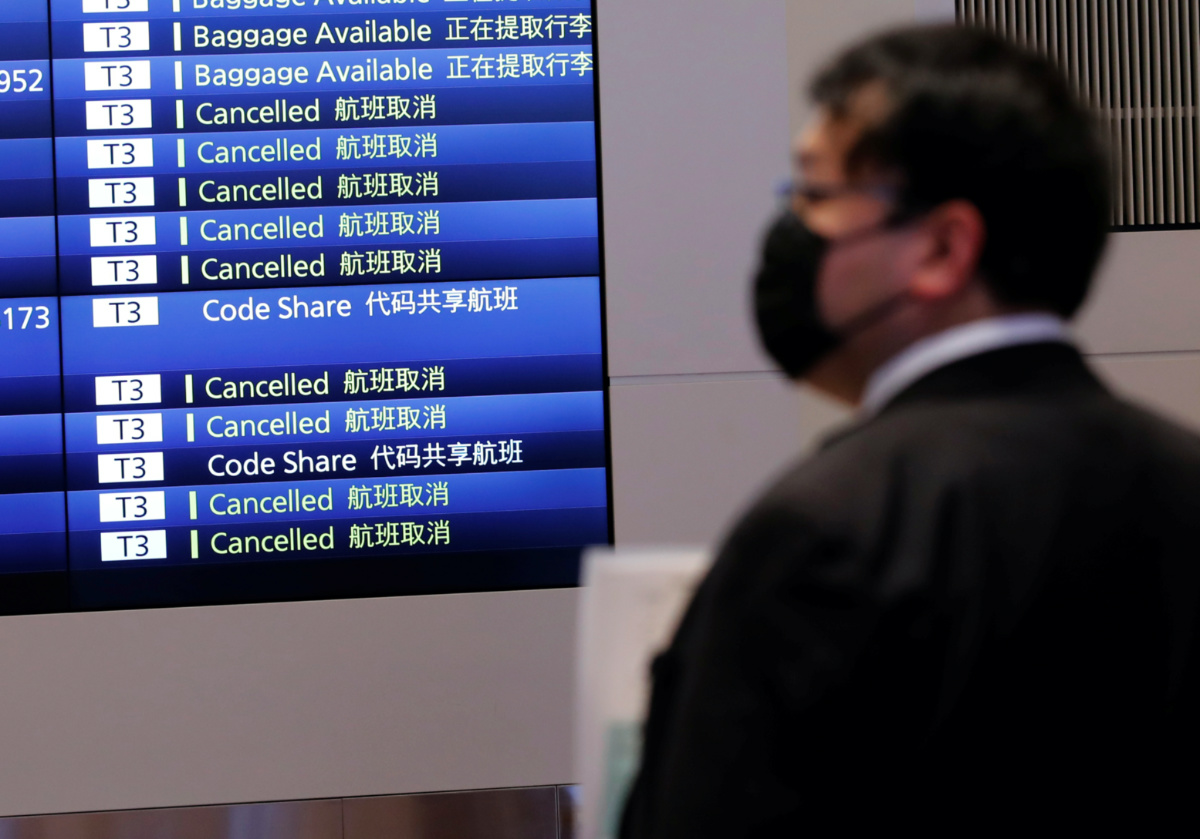The emergence of the heavily mutated COVID-19 variant Omicron has thrown a spotlight on huge disparities in vaccination rates around the globe.
Its appearance comes as many richer nations are ramping up boosters amid a surge in infections of the Delta strain, while some poorer countries have not yet vaccinated even one per cent of their population.

A man stands in front of a monitor showing flight schedules at an arrival hall of Haneda airport’s international terminal, amid the coronavirus disease (COVID-19) outbreak, in Tokyo, Japan, on 29th November. PICTURE: Reuters/Kim Kyung-Hoon.
Scientists have repeatedly warned that offering boosters in wealthy nations diverts doses from unvaccinated people in poor countries, paving the way for mutations that could threaten everyone – jabbed and unjabbed alike.
Richard Hatchett, CEO of the Coalition for Epidemic Preparedness Innovations, said Omicron’s emergence had fulfilled predictions that virus transmission in areas with low vaccination rates would speed its evolution.
“The inequity that has characterised the global response has now come home to roost,” said Hatchett, whose coalition funds vaccine development.
He noted that South Africa – where Omicron was first detected – had fully inoculated less than a quarter of its population.
The World Health Organization wants the most vulnerable people worldwide to be fully vaccinated before wealthier nations give third shots or vaccinate children.
Here’s what you need to know about vaccine inequity and the emergence of Omicron:
Who is most in need of vaccines?
An estimated 11 billion doses are needed to give everyone in the world two jabs.
While many nations are racing to get a third shot in everyone’s arm, less than six per cent of people in low-income countries have had even one dose, according to the Our World in Data project co-led by Oxford University.
In the UAE, one of the first countries to introduce boosters, 98 per cent of the population have already received at least one dose and 88 per cent have received two.
In Britain, 75 per cent have had at least one shot, and in the United States nearly 70 per cent. Most of these are fully vaccinated.
By contrast, less than three per cent of people in Nigeria, Mali, Cameroon and Sudan have been vaccinated, the majority with only one dose. In Haiti only one per cent of people have been reached, and in Burundi just 0.01 per cent.
Nigeria – Africa’s most populous nation – has announced it will start a mass COVID-19 vaccination campaign in November, and is making efforts to secure booster shots.
Are booster jabs for the wealthy impacting poorer countries?
With global demand for jabs outstripping immediate supply, the WHO has said that every extra dose going to a wealthy nation is one that cannot reach poorer countries.
John Nkengasong, head of the Africa Centres for Disease Control and Prevention, said the continent was far from reaching the African Union’s aim of fully vaccinating 70 per cent of people by the end of 2022.
The WHO has said countries should prioritise sharing vaccine doses with the COVAX programme to get doses to poorer countries over inoculating children, who rarely suffer severe illness.
Health experts say Omicron’s appearance underscores the need for equitable vaccine distribution.
“As long as large portions of the world’s population are unvaccinated, variants will continue to appear, and the pandemic will continue to be prolonged,” said Seth Berkley, head of the GAVI Vaccine Alliance that co-leads the COVAX initiative with the WHO.
We rely on our readers to fund Sight's work - become a financial supporter today!
For more information, head to our Subscriber's page.
Which countries are giving boosters?
Israel, Hungary and the UAE were among the first to announce they would be giving third shots back in August to increase antibodies and give stronger protection against COVID-19.
Many other countries – from Chile to South Korea – rapidly followed suit. In Gibraltar, Israel and Chile, more than 40 per cent of the population have already received a booster.
Many wealthier countries have quickly expanded their booster programmes – initially targeted at the most vulnerable – amid a surge in cases and worries about an increase of infections during the winter in the Northern hemisphere.
What is the view from South Africa?
President Cyril Ramaphosa of South Africa, whose virologists first identified the Omicron variant, said more people must get jabbed to fight the virus.
“The emergence of the Omicron variant should be a wake up call to the world that vaccine inequality cannot be allowed to continue. Until everyone is vaccinated, everyone will continue to be at risk,” he said.
But vaccine supply is not the main problem in South Africa, where logistics, vaccine hesitancy and apathy among the population have contributed to poor take up, health experts say.
Will the vaccines work against Omicron?
The short answer is nobody knows.
Omicron has spread very quickly, turning up in Australia, Britain, Germany, Italy, Belgium, Botswana, Israel and Hong Kong within a week of being reported by South Africa.
Its emergence has triggered fears that it could resist vaccinations and prolong the COVID-19 pandemic.
The new variant has over 30 mutations in the part of the virus that current vaccines target.
Scientists say Omicron is potentially more contagious than other strains, but do not know yet if it will cause more severe illness.
Drugmakers are scrambling to see if their COVID-19 vaccines remain protective.






